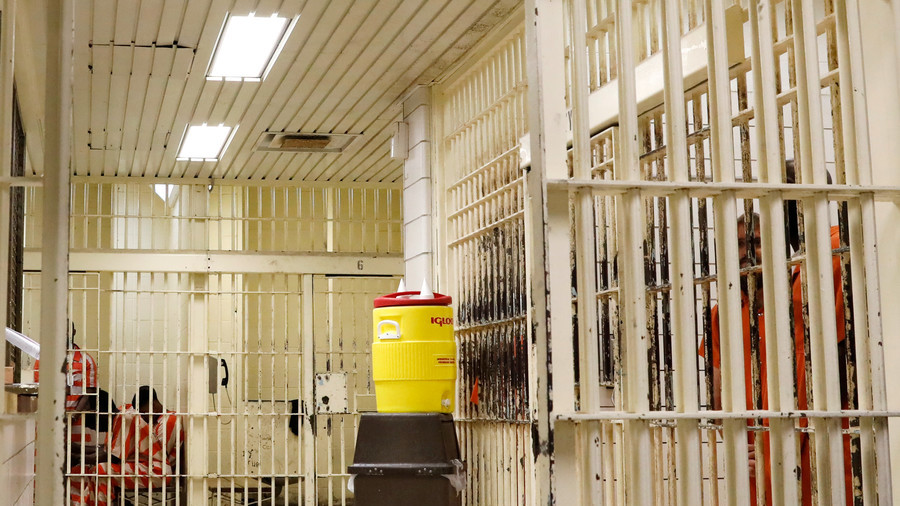Nationwide US prison strike demands end to ‘slave labor’ & ‘racist’ sentencing
The eight legs that hold up The USA and UK- Nato Democracy aka Modern Western European Christian Pilgrim Inquisition Operations of “Lands – Titles and Birth-Right Stealing”. Disguised Mass Genocide as Racism, Moors as Trade Goods, In Prison Industry Actually Human Trafficking, and every form of High Crimes World-wide. When one has no True Story of their own, The outright Theft and Impersonation of “Others Stories” that they then turn into “His-Story” seems their only option. All The Genocide, Tortures, Convoluting of Geography and Trading Places, are spelled out in 1. “Secret Treaty of Verona, 2. Unum Sanctum, 3. The Doctrine of Discovery, 4. The Inter Caetera Divina, 5. Dum Devertis, 6. Romanus Pontifex “6” Papal Bulls, plus the “1724 Christian Black Codes” and Cesti Que Act-1666. A Prime Example today is how Moorish Americans, the Founders of Civilization World-wide are largely being held as Chattel for World Trade on the Stock Markets in Concentration Style Prisons all over America, North, Central, South and Caribbean Islands. Then there are the so-called Black Civic and Civil Right Leaders who are the Actual Plantation Over-seers, being trotted out as Salvation again for our still mostly un-aware (Sleeping) Jailed, framed and Kidnapped Moorish Americans.
Published time: 21 Aug, 2018 19:23

Spearheaded by a group of prisoner activists called Jailhouse Lawyers Speak, the strike is supposed to take form of civil disobedience from August 21 to September 9. Protesters have published a 10-point list of demands, centering on restoring the voting rights of prisoners and ex-convicts and treating those imprisoned with dignity.
#August21
A nationwide prison strike is coming. Prisoner organized and led.
2 min ✊🏾 video laying it out. pic.twitter.com/9OUkrDYLJA— IWOC (@IWW_IWOC) August 13, 2018
Among the other demands are an “immediate end to prison slavery,” with everyone in prison to be “paid the prevailing wage in their state or territory for their labor,” and an “immediate end to the racial overcharging, over-sentencing, and parole denials of Black and brown humans.”
The activists are also demanding the abolition of several laws and federal programs that have imposed mandatory minimum sentences, require states to ensure violent offenders serve at least 85 percent of their sentence before becoming eligible for parole, or restrict prisoners’ ability to file lawsuits.PRESS RELEASE:
NATIONAL PRISON STRIKE AUGUST 21-SEPTEMBER 9TH, 2018 pic.twitter.com/Mzbb4e96yp
— Jailhouse Lawyers Speak #August21 (@JailLawSpeak) April 24, 2018
The American Civil Liberties Union has endorsed the strike, arguing that its key demand is the restoration of voting rights. Most US states bar prison inmates from voting, and in some cases deny the franchise to former prisoners as well. Only two US states – Vermont and Maine – allow all current and former prisoners to vote.
Incarcerated people are planning a nationwide strike starting tomorrow, their demands include better living conditions, sentencing reform, educational and rehabilitation opportunities, and an end to prison slavery. #August21https://t.co/abSFcgVxnJ
— Watching The Hawks (@WatchingHawks) August 20, 2018
Though the 14th Amendment to the US Constitution, adopted after the Civil War, allowed for suspending the voting rights “for participation in rebellion, or other crime” – clearly targeting the citizens of Southern states that fought to secede – the phrasing has allowed states to temporarily or permanently disenfranchise felons in general.
The other major grievance of the prisoners comes from the 13th Amendment, which in 1865 abolished slavery and involuntary servitude, “except as a punishment for crime whereof the party shall have been duly convicted.” This, they argue, means that slavery is alive and well in the US prison system.
North Jersey DSA supports and proudly endorses the nationwide prison strike set to begin August 21- September 9th. Prison labor is slavery and we demand its abolition.
Burn Down The American Plantation! #August21https://t.co/ZUJITFJflw
— North Jersey DSA 🌹 (@NorthNJDSA) August 14, 2018
Another connection to slavery is symbolic: August 21 is the anniversary of the 1831 slave revolt in Virginia led by Nat Turner. On the same day in 1971, prison activist and founder of Black Guerrilla Family, George Jackson, was killed during an attempt to escape from the San Quentin prison in California. Activists have referred to both anniversaries as meaningful for their choice of a starting date.
#ThisDayInHistory#August21, 1831 Nat Turner launches an all-out rebellion against the American plantation. 187 years later, the Civil War is over but slavery is NOT. Today, the #NationalPrisonStrike kicks off on #NatTurnerDay. #prisonstrike#TDIHpic.twitter.com/FuQvS7jPdG
— dissident poetry. #August21 (@raiseablackflag) August 21, 2018
September 9 was chosen as the strike’s closing day, to commemorate the 1971 rebellion at Attica Prison in upstate New York. Some 1,300 inmates at Attica demanded an end to slave labor and police brutality for four days, before a crackdown by law enforcement resulted in 39 people dead and 128 injured.
The 2016 prison strike, also organized by Jailhouse Lawyers Speak, chose September 9 as its starting date.
The US has the most prisoners in the world + the most prisoners per capita. Many of them are treated like slaves, working for corporate America for pennies. So we are the largest slave state in the world.
This is why a massive nationwide #PrisonStrike started today.— Lee Camp [Redacted] (@LeeCamp) August 21, 2018
The US ranks first in the world both in the total number of people in prison and the incarceration rate (655 per 100,000). There are approximately 2.3 million people in a wide range of prisons and jails in the US, according to the most recent figures by the Prison Policy Initiative. If one includes another 3.7 million currently on probation and about 840,000 on parole, the US judicial system actually exercises control over nearly 7 million people.



